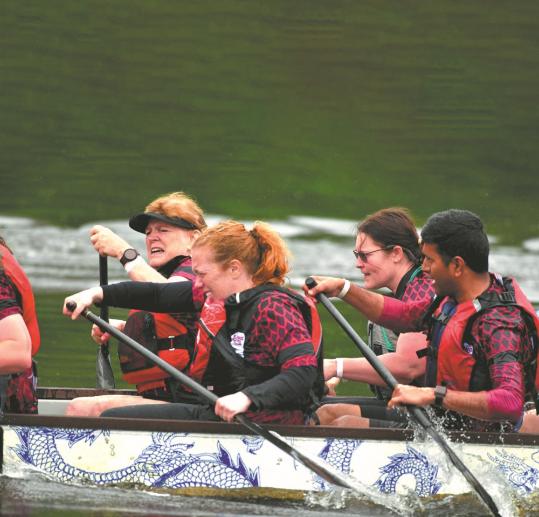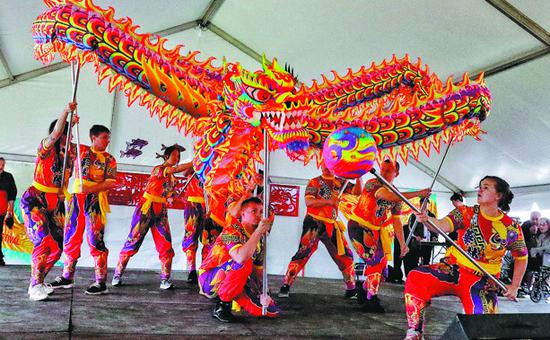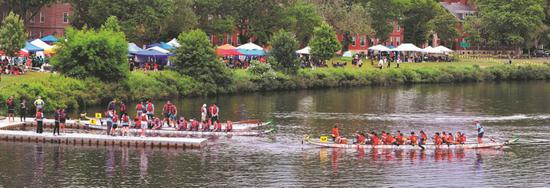Dragon boat racing brings fun, adrenaline to Boston
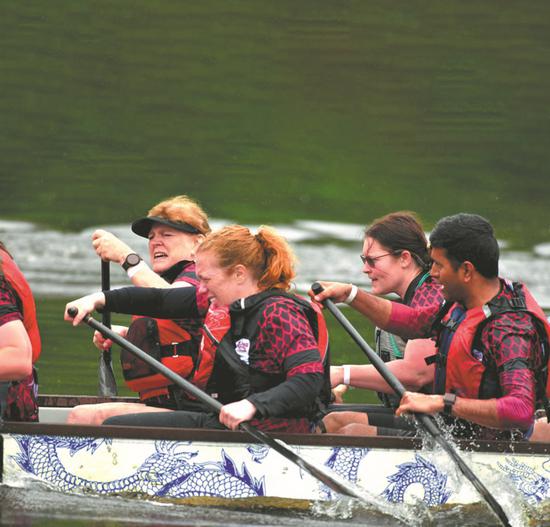
The Living Root club team races in the 45th annual Boston Hong Kong Dragon Boat Festival on Sunday. (WILL WANG/FOR CHINA DAILY)
On the Charles River over the weekend, thousands of people enthusiastically participated in dragon boat races, with a cultural fair on land celebrating the traditional Chinese festival.
Known as the first and oldest event in the United States celebrating the Dragon Boat Festival, the Boston Hong Kong Dragon Boat Festival was held on Sunday and featured 68 teams with about 2,000 participants from New York and the New England states.
"We want to promote dragon boat racing. We want to use this platform to promote Asian culture … people come here to learn, for exchange or just for fun, too," Gail Wang, president of the Boston Hong Kong Dragon Boat Festival's board, told China Daily.
Wang said dozens of volunteers for the 45th annual festival have been working diligently over the past year to preserve the tradition, while also offering a fresh perspective to attendees.
"It's very important for (connections) of people … culture exchanges, and that's what we do," she said.
The festival, also called Duanwu, is a traditional Chinese festival observed on the fifth day of the fifth lunar month. It commemorates the life and death of Qu Yuan, a poet and politician during the Warring States Period (475-221 BC). Upon hearing that his state, Chu, had fallen, he committed suicide by drowning in the Miluo River.
Legend says that the people of Chu rushed to the river to rescue him, but they were too late. So they threw zongzi, or traditional rice dumplings wrapped in bamboo leaves, into the river to keep the fish away from eating his body.
Today, zongzi and dragon boat racing have remained traditions for Chinese people. The historical significance, combined with fun, competitiveness and athleticism of racing, has transformed dragon boat racing into a sport that attracts participants from around the world. It also serves as a gateway for people to learn more about Chinese history and culture.
"I love to come to the Dragon Boat Festival. I think it's one of the best things that happens in Cambridge, and we're so delighted to welcome all of the rowers and everyone to Cambridge," said Jason Weeks, executive director of the Cambridge Art Council.
"It's very, very strong. We have just a robust community of folks here who keep all of the creativity alive." He said it was nice "to have a festival like this where we can all come together for the day and celebrate not just the races and the sporting aspects, but also especially the cultural aspects".
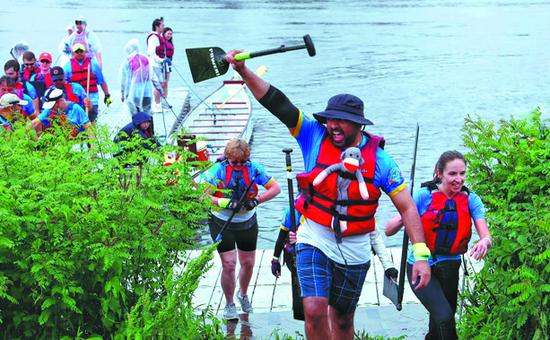
A paddler raises his paddle in celebration after finishing a race on Sunday. (LIU GANG/FOR CHINA DAILY)
Social cohesion
Weeks said the shape and design of the dragon boats are part of Chinese culture and art. "The arts and culture always create the opportunity for us to come together successfully and in a spirit of celebration," he said.
"No matter what the politics of the day or the difficulties or challenges we might face as a country or an area, I think the arts always bring us together and create social cohesion. And the festival is one of the biggest and best ways to bring all of the different communities of Cambridge together to celebrate the Chinese culture and history."
Roger Jones also enjoys dragon boat racing and the spirit behind it. He is the author of The Final Victory, a novel on the thrills and challenges of dragon boat racing.
"In 2005, I was diagnosed with a rare form of cancer, and a couple of years later, I started paddling with a dragon boat club in Charleston, South Carolina," Jones said. "In 2010, we decided that we wanted to put an all-cancer team together to see if we could compete at the national championship level."
He said he really did not think they had much of a chance to win, but they won the national championship.
"It was a great honor, and we earned the right to represent our division in Hong Kong the next year," he said, but the team was not able to go because some people were ill, and several died the next year.
"The book is a novel based on this team and what we did, what we accomplished, and just the inspiration that it brought to a lot of people, and the hope that it brought to people not quitting, giving up and moving forward and achieving something they didn't think they could ever achieve," he said.
"The thing with dragon boating is the support of a group. You're on the water, and (when) you are with other people who love you and support you, you just seem to do better."
Jones said he has also been involved with the dragon boat community and has learned more about Chinese culture.
"It's a wonderful, beautiful culture. I think the beauty of it is 20 people working in unison — that's the teamwork," he said.

